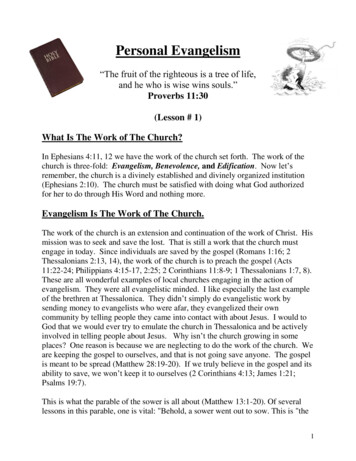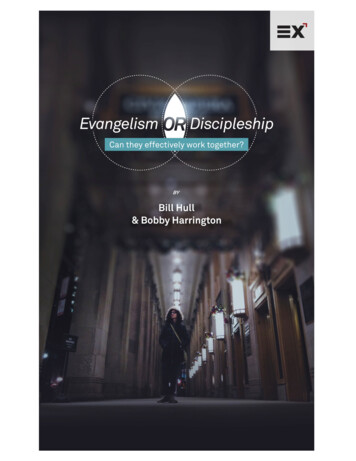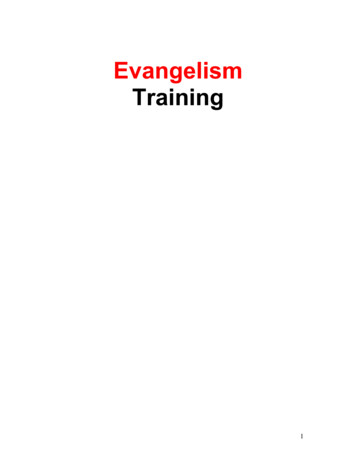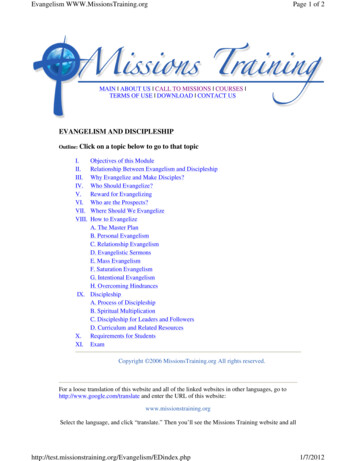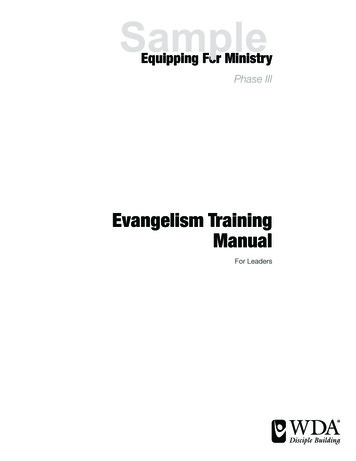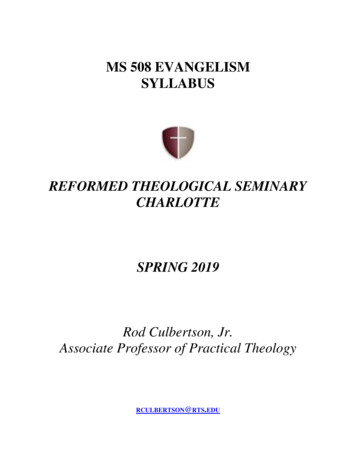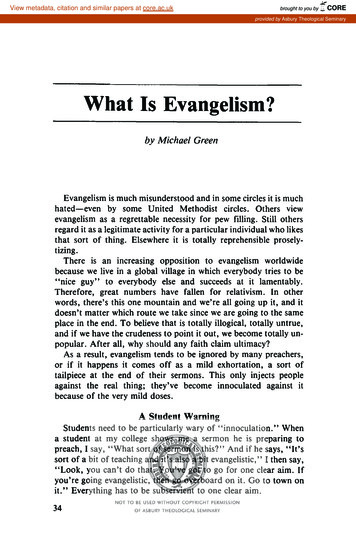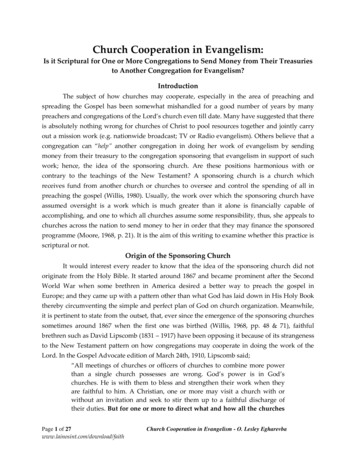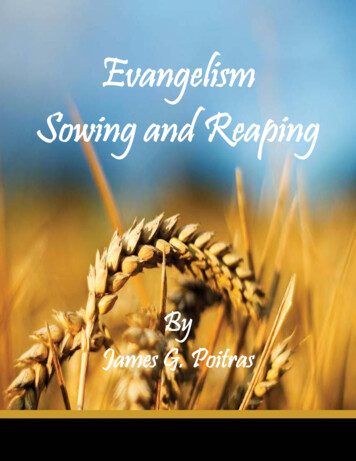
Transcription
EvangelismSowing and ReapingByJames G. Poitras
EvangelismLesson OneEvangelism and Farming“Then saith he unto his disciples, Theharvest truly is plenteous, but thelabourers are few; Pray ye therefore theLord of the harvest, that he will sendforth labourers into his harvest”(Matthew 9:37-38).FOCUS:God is interested in farming.Explain how it parallels to evangelism.WHAT I HAVE LEARNEDIn the Old Testament God established Hisinterest in farming, the oldest recordedprofession. The first man and woman,Adam and Eve, were placed in the Gardenof Eden (a farm) and were told, “work itand take care of it” (Genesis 2:15 NIV).Because Adam listened to his wife and atethe forbidden fruit, the ground wascursed. He continued to farm throughagonizing toil and sweat. Even though theyhad sinned, their responsibility for farmingcontinued.God has always been involved in a harvest.He is the “Lord of the harvest” (Matthew9:38). The Lord alone is in charge of Hisharvest (1 Corinthians 3:6-7). His peopleare merely seed sowers (farm hands).We look forward to hearing Him say onjudgment day, “You were a good farmer!”Well, not exactly, but we do want to hear,“Well done!”“The greatest Farmer the world has everknown is pursuing the greatest harvest theworld has ever seen.”(Dutch Sheets in The River of God)The Israelites were people of the land.Canaan was their inheritance.Thechildren of God were repeatedly told to“possess the land” (Deuteronomy 3:20).Each family received their portion. It wastheir property, never to be sold, alwayspreserved. As evangelists we have beengiven the land—our village, community, orcity. The land is ours! We must possess it.Jesus ministered to an agriculturallyoriented society. Most citizens were ruralpeople. Even those who lived in cities keptfarms outside of the city walls. They knewwhat it meant to work the land.Life depended on what could be grown.The essentials of life came from the landincluding food, clothing, and shelter. Dailylife revolved around the needs of the land.The daily life of the church revolvesaround our first priority, reaching theunreached. We have everything it takes toreach them. We have the Bible, and it hasthe answer for every question. Oldmethods of farming will always work. Theold-time religion found in God’s Word stillworks in reaping a harvest.Farming is important to survival. Farmersmake up forty-eight percent of the world’slabor force. Sixty percent of Africans farm,and sixty-one percent of Asians. “Despitethe expansion of commerce and industryand the importance of these activities tothe economy, most Africans remainfarmersandherders.”(EncartaEncyclopedia 2000 CDROM)
Through farming, food is provided for thepopulation so that life goes on. With aharvest of souls the church will not onlysurvive, but its future will be secured.2. Why were Adam and Eve placed in theGarden of Eden?In the early days farming was acooperative effort. Oxen and a plow werepassed from one field to another.3. Who is in charge of the harvest?Farming was so important to the childrenof God that religious life revolved aroundfour major feasts or celebrations.According to Dale Rumble in Behold theHarvest several of these celebrations wereshadows of future spiritual harvests to beenjoyed by the church.The Feast of Unleavened Bread remindedGod’s people that they had been set apartfrom Egypt and were not to be a part of asinful nation. Jesus is our Bread of Life.The Feast of the Passover reminded God’speople of their deliverance from bondage.It was fulfilled in the death, burial, andresurrection of Jesus Christ.The Feast of Pentecost was celebratedwhen the wheat was ripe for cutting. Itwas fulfilled by the outpouring of the HolySpirit (Acts 2:1-4). This feast pointed tothe day that God would reap the harvest.The Feast of Tabernacles will conclude thetime of spiritual harvest with a finalgathering of souls bringing His return.God promised to pour out His Spirit on allflesh (Joel 2:28-29). This is likened to theearly and latter rains, which brought thecrops to harvest. Farmers count on God tosend rain. Without the rains coming at theright time, crops dwindle and die. Therehas to be a right climate for crops to grow.WHAT HAVE YOU LEARNED?1. Whatistheoldestrecordedprofession?4. Comment on God’s people being apeople of the land.5. WhatpercentageofAfricafarm?6. What percentage of the world’s laborforce are farmers?7. What does a harvest of souls tell usabout the future of the church?8. Old Testament religious life revolvedaround four major feasts? What werethey?9. What were these celebrations ashadow of?10. What did the Feast of Pentecostrepresent?
EvangelismLesson TwoIntroducing the Farmers"A farmer went out to sow his seed”(Matthew 13:3, NIV).FOCUS: Introduce the farmers that willassist us in our study of evangelism.WHAT I HAVE LEARNEDRudyard Kipling in Just So Stories (1902)“The Elephant’s Child” said,“I keep six honest serving-men(They taught me all I knew).Their names are, What and Why and WhenAnd How and Where and Who.”We will be using six hard-working farmersto assist us in our study of evangelism.Their names are:bbbbbbWhat?Why?When?Where?How?Who?Hopefully, by the time this course iscompleted, you will have shifted intobeing a powerful witness and evangelistfor the Lord Jesus Christ.Students in a first year Bible school class inGhana came up with the following pointsconcerning farmers. Use your imaginationand see how these points relate toevangelism. Be aware; these points maysurface again throughout this textbook.A farmer:b Always looks at seasons. He knowswhen to plant and when to harvest.b Puts great value on his seeds becausehe knows the seeds he sows todaydetermines the harvest he will reaptomorrow.b Protects the plants from weeds, heat,insects, and animals.b Values time. He knows how to workhardanduseeffectivetimemanagement skills.b Practices pruning, and watering.b Is patient. He waits for theappropriate time to plant and harvest.b Know when he is winning or losing.b Plants but realizes that God gives theincrease.b Looks for the best, fertile land.b Builds storehouses to keep theharvested crops.b Knows the value of his crops.b Realizes it takes time to prepare theland. He is longsuffering.b Is not lazy.b Inspects the crops to determine growthand progress.b Does not know everything. He invitesexperts to help.b Realizes farming is a family affair.Everyone is needed and included in thework.b Is always looking for the rightequipment and tools.
b Depends on God for the rains.b Knows his fields.b Evaluates his harvest from season toseason.b Never goes to the field without tools.b Is happy when it comes to the harvest.b Knows that without a harvest he hasno future.b Always looks for new ideas.b Is always looking for workers to help inthe fields.b Is change-oriented. He experimentswith new methods.b Looks for buyers.b Plants a variety of seeds.b Knows that if he does not plant on theland somebody else will.One African leader on the last night of hispresidency said, “Tonight I go to bed apresident and will wake up in the morninga farmer.” He realized that he wasreturning to the basics of life as he left thepresidency.It is our hope that through studying thiscourse on evangelism that, regardless ofyour walk in life, you will wake up to beinga farmer in God’s kingdom. It is a noblepassion.Farmers know that to reap an abundantcrop they must sow their best.John Wesley once said,“Do all the good you can,By all the means you can,In all the ways you can,In all the places you can,At all the times you can,To all the people you can,As long as you can.”WHAT HAVE YOU LEARNED?1. What are names of the six hardworking farmers that will assist us in ourstudies of evangelism?2. List ten things you have learnedconcerning farmers in this lesson.3. How do farmers get the mostabundant crops?4. What did one African leader say onhis last night in presidency?
EvangelismLesson ThreeBetween Sowing and Reaping“Be not deceived; God is not mocked:for whatsoever a man soweth, that shallhe also reap” (Galatians 6:7).FOCUS: Explain the law of sowing andreaping as it relates to evangelism.WHAT I HAVE LEARNEDOur job is to sow the seed, despite theprevailing circumstances around us, and toleave the results up to God.Ghana’s first President, Kwame Nkrumahsaid, “I have sown the seed and indeed itwill germinate.” He understood the law ofsowing and reaping.A Look at the Scriptures“Be not deceived; God is not mocked: forwhatsoever a man soweth, that shall healso reap” (Galatians 6:7).“But this I say, He which soweth sparinglyshall reap also sparingly; and he whichsoweth bountifully shall reap alsobountifully” (2 Corinthians 9:6).“So shall my word be that goeth forth outof my mouth: it shall not return unto mevoid, but it shall accomplish that which Iplease, and it shall prosper in the thingwhereto I sent it” (Isaiah 55:11).A common theme that runs throughout thisbook is the law of sowing and reaping. Thisis also known as the Law of the Harvest.God promised that what we sow, we shallreap. We cannot reap a harvest if we arenot involved in sowing the seed. What yousow is what you get!Robert Louis Stevenson once said, “Don’tjudge each day by the harvest you reapbut by the seeds you plant.”“He that observeth the wind shall not sow;and he that regardeth the clouds shall notreap. In the morning sow thy seed, and inthe evening withhold not thine hand: forthou knowest not whether shall prosper,either this or that, or whether they bothshall be alike good” (Ecclesiastes 11:4, 6).To reap a harvest we need:; Seed (the Word of God),; Soil (the unreached), and; Sower (the evangelist or witness).Farm life follows a cycle: early rains, fieldsplowed, seeds planted, crops cultivated,and finally harvested. Farmers are oftenuneducated, but they know how to get aharvest.
SeasonsPreparing the SoilPlanting the SeedCultivating(Watering)Nurturing(Pull the Weeds)HarvestProcessagainPrayerGod’s Word1 Corinthians therelationship Between sowing and reaping, there aremany dangers—drought, dry winds, locustsor other bugs, weeds (tares/thorns), andtheft by birds. In Bible times crops wereprotected by watchmen (Jeremiah 4:17).The need for watchmen increased as thetime of harvest neared.There cannot be reaping until sowing takesplace. Someone must sow before anothercan reap.When someone comes forward in an altarservice, they bring a long history of soilbeing prepared and seeds being planted.“And he that reapeth receiveth wages, andgathereth fruit unto life eternal: that bothhe that soweth and he that reapeth mayrejoice together. And herein is that sayingtrue, One soweth, and another reapeth. Isent you to reap that whereon yebestowed no labour: other men laboured,and ye are entered into their labours”(John 4:36-38).Tim Downs in his Discipleship Journalarticle, “Sowing Circle,” introduces fourprinciples.1.The labor of ministry includes bothsowing and reaping.2.The reaper’s success depends onthe work of the sower. “I sent youto reap what you have not workedfor.”3.The sower has the harder job.“Others have done the hard work,and you have reaped the benefitsof their labor.” It takes one day toharvest what has been nurturedfor months.4.The sower and reaper work as ateam. “The sower and the reapermay be glad together.”“The fields tell the farmer what task isrequired for the day.”(Tim Downs, Discipleship Journal)The law of the harvest teaches us that:; You reap later than you plant.; If you do not plant, you will not reap.; You reap in proportion to what youhave planted. (Read 2 Corinthians 9:68.)“Consider carefully what you hear," hecontinued. "With the measure you use, itwill be measured to you-and even more.Whoever has will be given more; whoeverdoes not have, even what he has will betaken from him" (Mark 4:24-25 NIV).You always reap more than you plant.Someone has said, “Any fool can count theseeds in one apple, but only God can countthe apples in one seed.”One small kernel of corn is planted. Itproduces two stalks, and each one has twoears of corn. Each ear contains over sevenhundred kernels of corn. From one smallseed 2,800 more kernels are produced.
Farmers value their seed, knowing that theseeds sown today will determine theharvest reaped tomorrow.If seeds are carefully and prayerfullyplanted, God will cause them to produce.A farmer evaluates everything he does tosee if the activity contributes to theharvest. Harvest is that amazing seasonwhen farmers gather the fruits of theireffort. It is always harvest time for thechurch. The world is a field, ready to beharvested (John 4:35).WHAT HAVE YOU LEARNED?1. What is the “law of the harvest”?2. What do you think Robert L.Stevenson meant by, “ Don’t judge theday by the harvest you reap but by theseeds you plant”?3. What did Kwame Nkrumah say asquoted in this lesson?4. Write out Galatians 6:7. Learn thisverse by memory.5. What is needed in order to reap aharvest?6. What are the various seasons offarming?7. When someone comes to God is thisusually a result of one person plantingthe seed of God’s Word? Explain.8. Who has the hardest job, the soweror the reaper? Explain.9. What does the law of the harvestteach us?10. How many kernels of corn can beproduced from one kernel?11. When is it harvest time for thechurch?
EvangelismLesson FourThe Lost Harvest“The harvest is past, the summer isended, and we are not saved” (Jeremiah8:20).FOCUS: If we do not reap the harvest itwill be lost or someone else will reap it.WHAT I HAVE LEARNEDJesus used the example of the harvest torepresent the millions of people that needto be reached with the gospel. Thisexample is relevant for all times. Theimage of the harvest speaks to everyone.Even those who live in the city understandthe importance of the harvest. The harvestis necessary for our survival. Without it,there is suffering.An elderly, pioneer preacher was sittingbeside a young pastor in a church service,when John 4:35 was mentioned. With hishuge hand, he slapped the young man onthe leg and said in a loud voice, “Youngman, do you understand what thatscripture means? I’ll tell you. The crop isso ripe that unless someone gets to itimmediately, it will spoil.”It is not time to sleep during the harvest.We do not want the harvest to drop to theground and spoil. Jesus said, “Do you thinkthe work of harvesting will not begin untilthe summer ends four months from now?Look around you! Vast fields are ripeningall around us and are ready now for theharvest” (John 4:35, NLT).Curtis Young in the “The Lost Harvest”advises that the church cannot sit downand wait for people to come to God. “Ourjob is to labor so that there will be aharvest. The season of harvest is that shortperiod of time for gathering the ripenedgrain. The harvest can be lost duringharvest season if the church is notprepared and ready to thrust in the sickle.If the farmer is slothful and neglects theharvest, it will be lost. The samedisappointment which comes to him willalso come to the church when it is guilty ofbeing slothful.”Kenneth F. Haney in his timely book, OneVision, explains that only the prepared willreap the harvest. When the harvestconditions are right, the church mustmove. If we hesitate to reap the harvest,someone else will get to it first. Rev.Haney states, “Whoever is present andprepared is going to reap the harvest.”Paul Baumeister in Connect magazineWinter 2000, wrote, “There are good andbad harvesters A harvester is not bydefinition God’s harvester. A harvester ismerely someone who recognizes that thefields are white unto harvest. So, there areharvesters of all kinds, as well as apostolicharvesters. Why is everyone flocking tothese fertile areas? They recognize thegreat amount of crop ready forharvesting.”Many cults are prepared to reap a harvest.We cannot sit idly watching! Will you bethere to meet the challenge of the ripenedharvest?A terrible storm ruined a fine crop ofgrain. Crops on other farms had beengathered before the storm struck. Theowner of the field sadly stood, in silence,looking at his ruined harvest.A stranger walking along the road came upto the farmer and said, “It is a really sadsight, isn’t it?”
The farmer replied, “You would reallythink it was a sad sight if it were yourfield. I could not get anyone to help meharvest the field.” (Behold the Harvest byDale Rumble)A ripened harvest can be lost and go toeternal waste because the laborers are notin the field gathering the crop.Our goal is to harvest a crop of souls. “Andthe fruit they harvest is people brought toeternal life” (John 4:36, NLT). The enemywill do all possible to stop us fromreaching our target.Matthew 9:38 reveals the only prayerrequest ever given by Jesus. He said, "Sopray to the one in charge of theharvesting, and ask him to recruit moreworkers for his harvest fields" (TLB).Why should we pray that the Lord wouldsend more workers into the field?; Two situations: the harvest is great,and the workers are few. Luke 10:2tells us “the harvest is plentiful.”Every farmer with a bountiful harvestrejoices. This is a blessing. Theproblem is that a shortage of laborerscan also result in a lost harvest.; Jesus did not ask that we pray for theharvest (the unsaved world). They areripe, ready for harvesting. It is notsufficient to pray for the lost withoutgoing to the lost. Therefore, we praythat the saved will have a vision forthe lost world. Prayer awakens us tothe need of reaching the harvest. Ithas a way of shaping us so that He canuse us.; Faith is demonstrated through prayer.John saw a people of every tribe(Revelation 5:9).The mission wasaccomplished. Peter preached thatGod was going to pour out His Spiritupon all flesh (Acts 2:17).; Through prayer God touches hearts.When we pray we open ourselves tothe will of God, become sensitive toHis heartbeat, and join His labor force.; Time is running out. The harvest willbe lost if we fail to obey the greatcommission.“All of us must quickly carry out thetasks assigned us by the one who sentme, for there is little time left beforethe night falls and all work comes to anend” (John 9:4, TLB).Let us pray that the Lord of the Harvestwill send forth more farmers. Why not jointhe harvesting team now?WHAT HAVE YOU LEARNED?1. What is the harvest season?2. Kenneth Haney claims that only thosethatareandwill reap the harvest.3. What two situations are mentioned inMatthew 9:38?4. Why did Jesus ask us to pray forlaborers and not the harvest itself?5. What did John see in Revelation 5:9?6. What is a harvester?
EvangelismLesson FiveWhat Is Evangelism?“For the Son of man is come to seek andto save that which was lost” (Luke19:10).FOCUS: Provide a clear picture of what ismeant by “evangelism” and explain whywe should obey the great commission.WHAT I HAVE LEARNEDClose your eyes. Allow your mind to drawa picture of evangelism or an evangelist inaction. What do you see? Do you see acrusade with thousands of people gatheredlistening to a fiery, anointed evangelist?Do you see someone passing out tracts? Doyou picture a believer sharing histestimony with an unbeliever? What abouta preacher preparing a radio broadcast? Doyou envision a revival meeting in your localchurch? The picture you imagined explainsmuch about your concept of evangelism.Evangelism is:1. Sowing (planting) the seed (Psalms126:6).2. Reapingtheharvest.Jewshistorically called their rabbis andstudents “reapers” and their workofinstruction“theharvest”(Matthew 9:37-38).3. Fishing for men (Matthew 4:19).4. Persuading men (2 Corinthians5:11).5. Rescuing men (Jude 22-23).6. Sharing the good news (Luke 2:10).7. Winning souls into the kingdom ofGod (Proverbs 11:30).8. Fulfilling the great commission(Matthew 28:19-20).9. Going (Mark 16:15).10. Witnessing (Acts 1:8).11. Answering questions concerning thehope within (1 Peter 3:15).12. Speaking the truth in love(Ephesians 4:15).13. Guiding others to salvation (Acts8:29-30).14. Salting the earth (Matthew 5:13).15. Lighting the world (Matthew 5:14).16. Turning people from darkness tolight (Acts 26:18).17. Bearing precious seed that developsinto fruit that will remain (John15:8, 16).18. Seeking the lost (Luke 19:10).Evangelism is like a garden; if it is notplanted, it cannot be harvested.Evangelism is God’s work done throughpeople. It is reaching out to others who donot know the Lord Jesus Christ.W. E. McCumber in Everybody Into theField explains that in pagan times theannouncement of the emperor’s birthdayor his ascension to the throne was calledan “evangel.” The church later adoptedthis terminology in talking about thegospel.He defines evangelism as“everything the church does that aims atthe conversion of people.” It is more thanjust good news. It is God’s news!
Evangelism has been likened toone beggar telling another beggar whereto go to get bread.The great commission is found in fivelocations.;;;;;Matthew 28:19-20.Mark 16:15-18.Luke 24:47-49.John 20:21-22.Acts 1:8.“But when the Holy Spirit has come uponyou, you will receive power and will tellpeople about me everywhere" (Acts 1:8,NLT).WHAT HAVE YOU LEARNED?Why obey the great commission?1. It finishes the job Christ started andallows us to fulfill our purpose (andHis) on the earth.2. It helps us discover our potentialand use our talents for theexpansion of the kingdom.3. Evangelism provides new membersfor the church and members providethe needed finance.4. Obedience brings the joy to thesoul-winner. Leading someone tothetruthisthegreatestcontribution you can ever make tohis life.5. It helps us to establish life-longrelationships with others.6. It builds up church attendance andassures the future of the church.7. It causes rejoicing in heaven.8. It reminds us that we too were oncesinners.9. It keeps us on fire for God.10. It allows us to have a greaterpassion for the lost and vision toreach them.Think about it. If you knew you had onlyfive minutes left to live and many peoplewere listening to your last words, whatwould you say?With Jesus’ last earthly wordsreminded His disciples of whatexpected from them. He expected thatwherever they went, they would tellothers the good news about Him. It wasnot only a command, but also a promise.HeHe1.Providetenphrasesandcorresponding scriptural references thatgive us an idea of what is meant byevangelism.2. Give five reasons why we should obeythegreatcommission.3. Define evangelism.
EvangelismLesson SixWho to Evangelize?“And he said unto them, Go ye into allthe world, and preach the gospel toevery creature” (Mark 16:15).FOCUS: Explain who is to be evangelizedand provide statistics on the unreached.WHAT I HAVE LEARNED“The Lord is not slack concerning hispromise, as some men count slackness; butis longsuffering to us-ward, not willing thatany should perish, but that all should cometo repentance” (2 Peter 3:9).God is patient with us (believers); notwilling that any (of the unbelievers) shouldperish, but that all should come torepentance. God wants all men to besaved. He wants no one to perish.Mark Conner in Transforming Your Churchsuggests four areas of outreach.1. Inside the church. Many peoplevisit our church meetings. Howthese people are treated will havea big impact on whether or notthey become converted.2. Friends.Each Christian has anetwork of friends and contactsthat do not yet know the Lord. Thelonger we are Christians the moreweisolateourselvesfromfriendships outside of the church.You can reach certain people otherscannot reach. Nine out of ten peoplecome to Christ as a direct result ofrelationships.Studies show that many people leavingthe church do so because they cannotfind a friend in the congregation.3. Community. The great commissionis to “go.” We must go to ourcommunity. It is our harvest fieldright at our doorsteps.4. World. We are to go into theentire world and preach the gospelto every creature. This includespeopleoftenforgottenoroverlooked—the poor, crippled,lame, and blind (Luke 14:12-14).Add to this list drunkards,prostitutes, drug users, AIDSpatients, and derelicts. They willcome with their problems, butJesus is the answer. His desire isthat His house will be full (Luke14:23).Jack Cunningham in Advanced ChurchPlanting says, “In the last fifteen yearsone billion people have entered eternity.Half of them (500 million) never heard thename of Jesus spoken one time in theirlifetime. Every day 139,560 people die;339,500 are born. The earth’s populationis increasing by 200,000 every day. Whenyou go to church next Sunday, there willbe over one million more people in theworld than last Sunday.”Statistics show (October 1999) the worldpopulation has passed the six billion mark.Every twelve years one billion more peopleare added.G. Randy Adams in World Missions(Ministerial Development Series) said if allthe unsaved people in the world were toline up single file at your front door, theline would reach around the world thirtytimes. This line would grow by thirty-twokilometers each day. If you were to drive acar at eighty kilometers per hour for tenhours a day, it would take you four years
and forty days to get to the end of this lineof lost souls. And by then it would haveincreased in length by 48,279 kilometers.The teacher lifted his eyes gesturingupward. A silence settled over theclassroom.But, if there were only one Christian onthe face of the earth, and he determinedto reach one other person within a year,and then they determined to reach oneother person each for the following year,and this process continued, in thirty-threeyears there would be more than fourbillion believers. In thirty-four years therewould be 8,589,934,592 Christians.McQuilkin provides five answers to thequestion, “How come?”Wycliffe Bible Translators report that over440 million people still do not have theBible in their language. The U. S. Centerfor World Missions estimates that there are8,000 people groups that do not haveaccess to a church or the opportunity tohear the gospel.Why Are So Many Still Unreached?Robertson McQuilkin in The GreatCommission: A Biblical Basis for WorldEvangelism relates a story that took placewhile he was teaching a large group ofstudents. He had just explained how halfof the world’s population has not heardthe good news and cannot hear becausethere is no witnessing church among them.“How come?” a voice rang from the backof the auditorium.“How come, what?” McQuilkin asked.“With so many lost people, how come sofew are going?”“That is a good question,” McQuilkinresponded.“In fact, I know someone who asks thatquestion every day.”“Who’s that?” asked the student from theback of the auditorium.1. Heart Trouble. We do not careabout the lost. We are preoccupiedwith our own interests and needs.2. Eye Trouble. We do not have avision. We do not see the peoplefrom God’s perspective.3. Head Trouble. We think there mustbe another way.4. Knee Trouble. We treat praying asa nonessential in life. Studies showthat many spend as little as fourminutes a day in prayer.5. Ear Trouble. Someone is notlistening to the call. God is calling,but people are not listening.“And how can they believe in him if theyhave never heard about him? And how canthey hear about him unless someone tellsthem?” (Romans 10:14, NLT)Who Needs to Be Reached?There are so many unreached people inthe world. Who is to be evangelized? Theeasiest response to the question is“everybody.”We will look at morespecific groups of those that should beevangelized in a future lesson. Let us lookat who should be evangelized in a generalsense.1. Sinners— transgressor, natural man,unrighteous man, heathen (Psalms2:8), unbeliever.
A sinner is:; Someone that does the works of theflesh (Galatians 5:19).; Dead in trespasses and sin (Ephesians2:1).; Walks according to the course of thisworld (Ephesians 2:2).; A person living in spiritual darkness(Ephesians 5:8).; A person that is condemned (John3:18).; A servant of sin (Romans 6:15-18).; Born in sin (Psalms 51:4-5).; Someone who has not obeyed thegospel (James 1:22; 4:17).More Facts on Sin; All have sinned (Romans 3:23).; There is none righteous (Romans 3:10).; The payment of sin is death (Romans6:23).; One man brought sin (Romans 5:19).; Sin is transgression (1 John 3:4).; All unrighteousness is sin (1 John 5:17).Jack W. Hayford in Spreading the GoodNews to Everyone says that worldevangelism will take place when we see allpeople as God sees them—as sinners(Romans 3:10; 3:23; 6:23).; Unbelievers. There are three types ofunbelievers in this world: those thatwillfully reject truth; those that putoff accepting truth, the neglectors;and those that have never heard. Allthree groups will be lost andcondemned because they have notbelieved. (See John 3:14-18; Romans10:13-15.); The lost (Luke 19:10). Read the “LostChapter”—Luke 15. The lost sheepknew that he was lost but didn’t knowhis way back home. The lost coin waslost but didn’t even know that it waslost. The prodigal son knew he waslost and knew his way back home. BillHybels in Becoming a ContagiousChristian suggests that Jesus toldthese three stories in rapid successionto make an impression on His listeners.This is the only time that Jesus toldthree parables in a row. He wanted tomake sure that everyone understoodwhat and who really matters to God.In each story great value was attachedto what was missing. The lost sheepmattered to the shepherd. The lostcoin was of great value to the woman.The wayward son mattered to thefather. All heaven rejoices when thelost are found. The lost matter to God!2. God-fearers:; Do not have a full knowledge of thetruth. Speak the truth in love to them(Ephesians 4:15).; We need to identify where they are intheir spiritual walk and then show themthe way of God more perfectly.; Provide further truth for seriousseekers: Cornelius (Acts 10); Apollos(Acts 18); Lydia (Acts 16); disciples atEphesus (Acts 19); Ethiopian eunuch(Acts 8). In each case, the preacherstarted where they were spiritually andprogressed from there.3. Backsliders (Galatians 6:1).; Prodiga
Evangelism Lesson Three Between Sowing and Reaping “Be not deceived; God is not mocked: for whatsoever a man soweth, that shall he also reap” (Galatians 6:7). FOCUS: Explain the law of sowing and reaping as it relates to evangelism. WHAT I HAVE LEARNED A common theme that runs th
